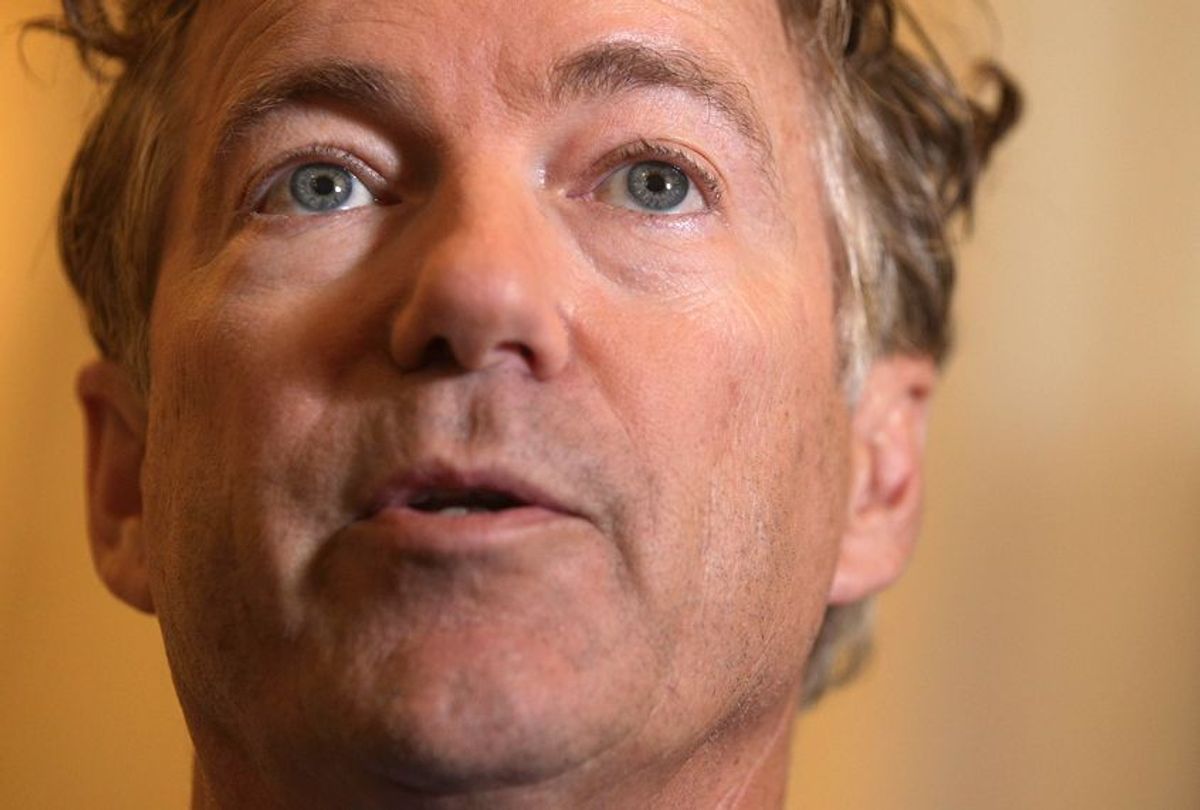Anything can change in politics, especially since Donald Trump is the president. But it's starting to look like congressional Republicans are going to follow their repeated failures to pass a health care bill with a series of flops on taxes.
As before, Mitch McConnell, the party's leader in the Senate, is caught between the conflicting demands of various of his members.
On one side is Kentucky Sen. Rand Paul, the self-styled libertarian whose pleas for spending cuts have been ignored for years by his fellow Republicans. In the current debate, Paul is criticizing the GOP for trying to partially offset an estimated $5.8 trillion in tax cuts with revenue increases in other areas.
"There's a possibility the people in the middle could have a tax increase," Paul said during a Tuesday interview with Fox Business Network. He referred to several proposed tax increases currently being touted by the White House and congressional GOP leaders, including the elimination of federal tax deductions for state and local taxes. Paul has said in the past that he prefers tax cuts be offset by spending cuts.
The Kentuckian is also criticizing the Senate GOP's budget resolution for not adhering to previous spending caps. He singled out Arizona Sen. John McCain and South Carolina Sen. Lindsey Graham as trying to increase military spending at the expense of fiscally responsibility.
"People like McCain and Graham, who parade as conservatives but are not really conservative, they need to be called out because they are bankrupting our country," Paul told reporters on Tuesday at the Capitol.
"Why is the deficit bigger all the time, under Republicans or Democrats?" he said. "Because neither one of them are conservative. And I frankly am infuriated by the idea that these people will continue to throw wool over the eyes of the American voter and simply say 'Oh, we're conservative' and yet they pass stuff that is just, frankly, not conservative."
McCain and Graham have long been at odds with Paul, primarily over foreign policy issues. Both generally favor increased military budgets and foreign intervention, while Paul is effectively an isolationist.
Both men responded to Paul's criticisms almost immediately. "I don't pay any attention to Sen. Paul. Nor does hardly anybody else," McCain told Bloomberg News. The comment was a reiteration of an April remark in which the Arizonan said that Paul "doesn't have any real influence in the United States Senate."
“Sen. Paul can’t vote yes on anything because it’s never good enough,” Graham said in a Tuesday press briefing. On Twitter, he accused Paul of having "saved Obamacare" by being one of a handful of Republicans who torpedoed Graham's last-ditch effort to repeal Obamacare in September. He did not mention that McCain, his longtime ally and friend, had also "saved Obamacare" by refusing to support his bill.
Speaking to Politico, Paul said the GOP leadership was hypocritical in its refusal to accommodate his desire for $43 billion in cuts to overseas war spending.
“These are the people who come to our caucus every day and say: ‘Oh the budget doesn’t matter, it’s just a vehicle to get to taxes,’” Paul said. “And yet when I ask for something they aren’t willing to do it.”
While Paul's concerns over military spending are not widely shared by his Republican colleagues, at least a few have been sympathetic to his other concerns, particularly the GOP's idea of eliminating taxpayers' ability to deduct their state and local income taxes from the amount they pay to the federal government. The proposal has been called unfair by numerous politicians from states with higher taxes.
"I’m going to fight this out and hopefully have success in getting this restored,” Rep. Tom MacArthur, a New Jersey Republican, said last month. "I am going to do what I can to rally states like New Jersey and New York, Pennsylvania, California, Illinois, Connecticut.”
New York Gov. Andrew Cuomo, a Democrat, spoke out against the state and local tax increase idea in September: "I'm saying to our congressional representatives: You do whatever you have to do to stop this. I don't care if you have to filibuster. I don't care if you have to lay across the Senate floor and force them to remove you, bodily, from the chamber. This cannot happen. It would be devastating to the people of the state of New York."
Concerns from Republicans representing Democratic-leaning and swing areas are likely to mean that the GOP will eventually just seek to pass a temporary tax cut, with no regard for its impact on the federal deficit. As things stand, the GOP's current proposal may result in a revenue loss of $2.2 trillion over 10 years, according to an estimate prepared by the Committee for a Responsible Federal Budget, a nonprofit group that supports balanced budgets.
While abandoning their offset plans may address concerns from blue- and purple-state Republicans, a move to increase the deficit is also likely to meet opposition from other Republicans besides Paul.
Tennessee Sen. Bob Corker is one such objector. He's repeatedly called out Republican leaders for making unrealistic assumptions about the economic growth that would ensue due to tax cuts, saying in late September there was "no way in hell" he would support a bill that would result in more than $1.5 trillion in revenue losses.
Other Republicans may join Corker's efforts. Last week, Indiana Sen. Todd Young told the Indiana Business Journal he would not vote for a tax bill that could "blow a hole in the budget."
“We can’t assume unreasonable rates of economic growth or we’re being fiscally irresponsible," Young added.

Shares